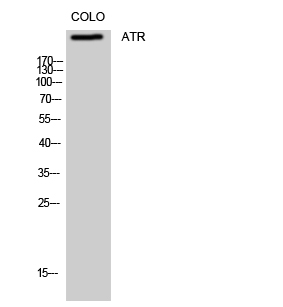ATR Polyclonal Antibody
- Catalog No.:YT0416
- Applications:WB;IHC;IF;ELISA
- Reactivity:Human;Mouse
- Target:
- ATR
- Fields:
- >>Fanconi anemia pathway;>>Cell cycle;>>p53 signaling pathway;>>Cellular senescence;>>Human papillomavirus infection;>>Human T-cell leukemia virus 1 infection;>>Human immunodeficiency virus 1 infection
- Gene Name:
- ATR
- Protein Name:
- Serine/threonine-protein kinase ATR
- Human Gene Id:
- 545
- Human Swiss Prot No:
- Q13535
- Mouse Swiss Prot No:
- Q9JKK8
- Immunogen:
- The antiserum was produced against synthesized peptide derived from human ATR. AA range:394-443
- Specificity:
- ATR Polyclonal Antibody detects endogenous levels of ATR protein.
- Formulation:
- Liquid in PBS containing 50% glycerol, 0.5% BSA and 0.02% sodium azide.
- Source:
- Polyclonal, Rabbit,IgG
- Dilution:
- WB 1:500 - 1:2000. IHC 1:100 - 1:300. ELISA: 1:40000.. IF 1:50-200
- Purification:
- The antibody was affinity-purified from rabbit antiserum by affinity-chromatography using epitope-specific immunogen.
- Concentration:
- 1 mg/ml
- Storage Stability:
- -15°C to -25°C/1 year(Do not lower than -25°C)
- Other Name:
- ATR;FRP1;Serine/threonine-protein kinase ATR;Ataxia telangiectasia and Rad3-related protein;FRAP-related protein 1
- Observed Band(KD):
- 300kD
- Background:
- The protein encoded by this gene belongs the PI3/PI4-kinase family, and is most closely related to ATM, a protein kinase encoded by the gene mutated in ataxia telangiectasia. This protein and ATM share similarity with Schizosaccharomyces pombe rad3, a cell cycle checkpoint gene required for cell cycle arrest and DNA damage repair in response to DNA damage. This kinase has been shown to phosphorylate checkpoint kinase CHK1, checkpoint proteins RAD17, and RAD9, as well as tumor suppressor protein BRCA1. Mutations of this gene are associated with Seckel syndrome. An alternatively spliced transcript variant of this gene has been reported, however, its full length nature is not known. Transcript variants utilizing alternative polyA sites exist. [provided by RefSeq, Jul 2008],
- Function:
- catalytic activity:ATP + a protein = ADP + a phosphoprotein.,cofactor:Manganese.,disease:Defects in ATR are a cause of Seckel syndrome type 1 (SCKL1) [MIM:210600]. SCKL1 is a rare autosomal recessive disorder characterized by growth retardation, microcephaly with mental retardation, and a characteristic 'bird-headed' facial appearance.,enzyme regulation:Activated by DNA and inhibited by BCR-ABL oncogene. Slightly activated by ATRIP. Inhibited by caffeine, wortmannin and LY294002.,function:Serine/threonine protein kinase which activates checkpoint signaling upon genotoxic stresses such as ionizing radiation (IR), ultraviolet light (UV), or DNA replication stalling, thereby acting as a DNA damage sensor. Recognizes the substrate consensus sequence [ST]-Q. Phosphorylates BRCA1, CHEK1, MCM2, RAD17, RPA2, SMC1 and TP53/p53, which collectively inhibit DNA replication and mitosis and promote DN
- Subcellular Location:
- Nucleus . Chromosome . Depending on the cell type, it can also be found in PML nuclear bodies. Recruited to chromatin during S-phase. Redistributes to discrete nuclear foci upon DNA damage, hypoxia or replication fork stalling.
- Expression:
- Ubiquitous, with highest expression in testis. Isoform 2 is found in pancreas, placenta and liver but not in heart, testis and ovary.
The ATM and ATR kinases regulate centrosome clustering and tumor recurrence by targeting KIFC1 phosphorylation. Nature Communications Nat Commun. 2021 Jan;12(1):1-16 WB Human 1:500 MDA-MB-231 cell
RSF-1 siRNA Enhances Tumor Radiosensitivity in Cervical Cancer via Enhanced DNA Damage, Cell Cycle Redistribution, and Promotion of Apoptosis. OncoTargets and Therapy Oncotargets Ther. 2020; 13: 3061–3071 WB Human HeLa cell, SiHa cell
- June 19-2018
- WESTERN IMMUNOBLOTTING PROTOCOL
- June 19-2018
- IMMUNOHISTOCHEMISTRY-PARAFFIN PROTOCOL
- June 19-2018
- IMMUNOFLUORESCENCE PROTOCOL
- September 08-2020
- FLOW-CYTOMEYRT-PROTOCOL
- May 20-2022
- Cell-Based ELISA│解您多样本WB检测之困扰
- July 13-2018
- CELL-BASED-ELISA-PROTOCOL-FOR-ACETYL-PROTEIN
- July 13-2018
- CELL-BASED-ELISA-PROTOCOL-FOR-PHOSPHO-PROTEIN
- July 13-2018
- Antibody-FAQs
- Products Images
.jpg)
- Fan, G., Sun, L., Meng, L. et al. The ATM and ATR kinases regulate centrosome clustering and tumor recurrence by targeting KIFC1 phosphorylation. Nat Commun 12, 20 (2021).

- Western Blot analysis of COLO cells using ATR Polyclonal Antibody cells nucleus extracted by Minute TM Cytoplasmic and Nuclear Fractionation kit (SC-003,Inventbiotech,MN,USA).

- Immunohistochemistry analysis of paraffin-embedded human colon carcinoma, using ATR Antibody. The picture on the right is blocked with the synthesized peptide.



